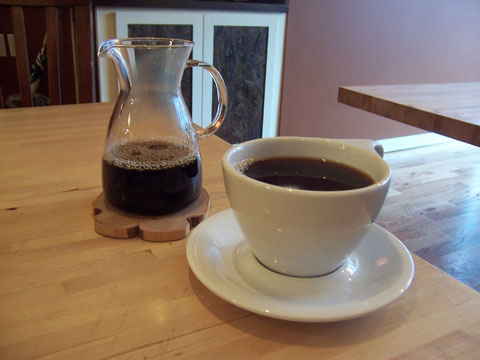
THE ARTISANAL RESULT A pour-over at the Speckled Ax. |
Everyone knows that geeks are ruining our culture and economy. But are they ruining our coffee too? Obsessive arguments over taste and technique are at root a way to avoid the risks of more open-ended and unpredictable engagements with others. Now new trends in coffee-making threaten to bring such didacticism into the coffeehouse — one of the central institutions in the development of the democratic public sphere, thanks to the caffeine-fueled open conversation that cafés so often host. In seeking to perfect coffee, will these obsessives kill its appeal, like Derrida did to the criticism of literature, or Bruce Jenner did to his face? A couple of new coffeehouses in Portland offer a chance to investigate.
The new trend in coffee, sometimes referred to with self-congratulation as the "third wave," comes down to this: stop roasting the crap out of your coffee. That way you can actually taste the bean you are drinking, and not just char and acid. Under this banner marches a plethora of new obsessions: freshness of the roast, seasonality of the bean, temperature of water, moistening of the filter, pre-heating of the cup, and carefully measured pressure in the tamping of grounds. There is something to be said for all this. But there is also a real risk of saying too much.
The Speckled Ax is run by Maine's longest tenured new-wave coffee freak: Matt Bolinder of Matt's wood roasted coffee. The café is named for a fable mentioned in Ben Franklin's autobiography about the dangers of perfectionism — a fable Franklin mentions only to reject. Bolinder's café strikes a balance between Franklin and the fabulist, since his café offers all the trappings of the new trends, but does so with a light touch.
The space is handsome and wood-filled, under a lovely inlaid ceiling, with seven tables for working or chatting. Elegant glass siphons sit ready upon the coffee bar, but most customers will opt for the "pour-over" coffee, made with cone filters to order. A Colombian bean highlighted the benefits of the new approach. It had an orangey, citrus-sour thing going on, without losing the rich roasty quality that many coffee drinkers want. Ghanaian espresso had a great dark-cocoa flavor.
While Bolinder is our home-grown coffee geek, Tandem Roasters is run by some well-pedigreed imports: several former muckety-mucks from San Francisco's trend-leading Blue Bottle Coffee. In fact Tandem uses the original Marzocco machine from the legendary Hayes Valley Blue Bottle. Your roaster has a hipster mustache, and two machines in plain view — including a red small-batch roaster that looks like a DIY chemistry set. Tandem has transformed an old office in Portland's underdeveloped East Bayside, creating a spare and elegant white space, and uncovering a great old wood-beam ceiling. There are narrow counters rather than tables.
Tandem has differentiated itself from Blue Bottle by going even lighter with their roasts. It was too light for me. Served in a small glass cup, a pour-over made with beans from Belalcazar, Colombia, resembled tea. I tasted something vegetal and floral that a longer roast would have obscured, I suppose, but I longed for something richer. The espresso made up for it, with a darker flavor but still some nice veggie notes. The house iced coffee was terrific. It's made with a porter malt that gives it a chocolate flavor and a touch of sweetness.